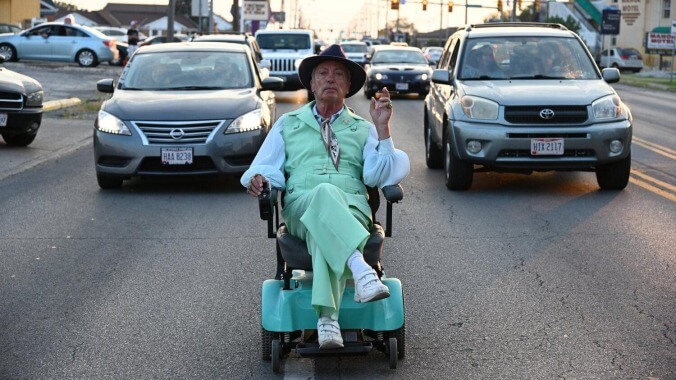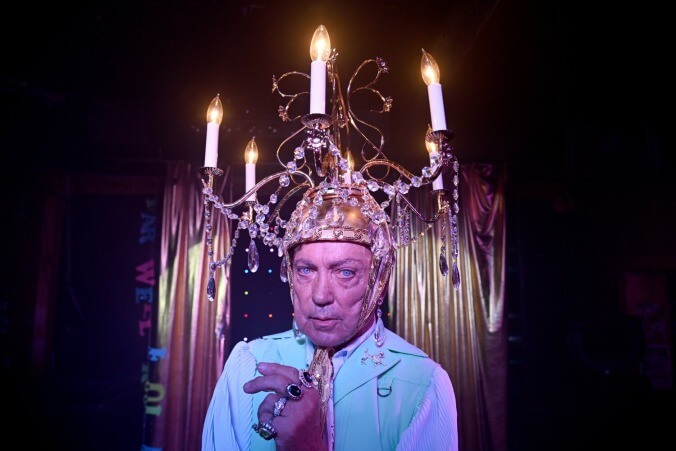Udo Kier takes his Jazzy on one last joyride in the touching Swan Song
Edge Of Seventeen writer Todd Stephens returns to his Ohio hometown for this tender, elegiac dramedy


Thinking about the devastation AIDS brought upon the LGBTQ+ community can be overwhelming. An entire generation’s worth of experiences, expertise, creativity, insight, love, life—just gone. And yet, those who survived refused to dim their shine. This bittersweet thought hangs in the background of Swan Song, writer-director Todd Stephens’ elegiac ode to the gay elders who made it possible for younger generations to live openly and proudly. But while the appreciation Stephens has for these pioneers is touching—the film was inspired by a real person, “Mr. Pat” Pitsenbarger, one of the few out gay men in Stephens’ hometown of Sandusky, Ohio in the ’80s and ’90s—this final act is presented with attitude and style, too.
Udo Kier stars as the fictionalized Mr. Pat, a retired hairdresser who at the beginning of the film has resigned himself to a life of cinderblock walls and dirty sweats in an anonymous nursing home. He still enjoys fixing fellow residents’ hair, and sneaks long, undoubtedly stinky cigarillos when the nurses aren’t looking. But mostly, Mr. Pat lives in the past. So it’s a bit confusing when the past comes to visit him, in the form of an attorney (Tom Bloom) who informs him that a former client, socialite and “demanding Republican monster” Rita Parker Sloan (Linda Evans), has willed Mr. Pat $25,000 with one condition: He has to do her hair for her funeral.
Rita and Mr. Pat fell out long ago, when Rita refused to attend the funeral of Mr. Pat’s longtime partner, David (Eric Eisenbrey), because David died of AIDS. Mr. Pat’s life crumbled after that, as he first lost his home—which was in David’s name—and then his business when a former employee, Dee Dee Dale (Jennifer Coolidge), opened a rival salon across the street. Decades of bitterness and resentment have built up on all sides, but the terms of Rita’s posthumous offer are too good to pass up. And so Mr. Pat takes off on foot (and later, on wheels) through Sandusky, visiting gravesites both literal and metaphorical on his way to the funeral home where Rita lies in her coffin, looking a real mess.
Stephens, who wrote the gay teen romance Edge Of Seventeen two decades ago, structures Swan Song as a requiem for a town as well as a person, as Kier passes crumbling brick houses and boarded-up storefronts that were once vibrant and full of life. The gay bar where Mr. Pat used to perform every Saturday night is closing down, made obsolete by dating apps. But Mr. Pat’s journey through this dying Rust Belt city is a charmed one, and everyone he meets is eager to help him along, whether it be the sweet Christian lady who gives him a ride to the cemetery or the thrift store employee who hooks him up with a mint green pantsuit she’s been saving for the right customer. And Kier does cut a charming figure, vamping and flirting and cracking jokes with his fingers covered in the rings David gave him as tokens of love.
But when Stephens cuts to a closeup of Kier’s face, the actor’s famous piercing blue eyes look like they’re about to well up. And while you’ll never forget the sight of Kier, his hand on one hip, quipping, “I know what you’re thinking. How could someone so flawless possibly be on Social Security?” to a gobsmacked gas station attendant, there’s an undercurrent of sadness to the performance that’s often more effective than the comedy. Even when Coolidge is tossing catty barbs at Kier, the mood feels heavy, in part because the veteran scene-stealer is playing a more grounded character than she usually does. And while it’s not clear if the real Mr. Pat was from Germany, Kier seems out of place among the corn-fed Midwesterners he encounters in Sandusky, his bon mots landing awkwardly as they look on, confused. But perhaps that’s the point.
So yes, Swan Song can be clumsy and sentimental at times, but that’s sometimes the cost of earnestness. And Stephens has heartfelt things to say about the LGBTQ+ generation gap—”I don’t even know how to be gay anymore,” Mr. Pat laments at one point—and the need to respect and appreciate those who paved the road to mainstream acceptance. This theme is best expressed through a minor character, Rita’s grandson Dustin (Michael Urie). Dustin has never met Mr. Pat face to face, but his grandma’s friendship with her hairdresser, as fraught as it may have been, helped her accept Dustin when it was his turn to come out. If the closet door is open, Stephens posits, it’s because people like Mr. Pat kicked it down. Swan Song is his way of saying thanks.